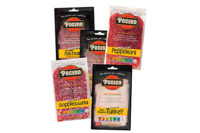Pocino Foods began as a manufacturer of Italian specialty products and has grown to include whole-muscle items like roast beef and pastrami, a Hispanic foods line that includes carnitas and chorizo, pizza toppings and more. Frank Pocino, president of Pocino Foods and son of the co-founder, estimates that the company manufactures more than 250 SKUs. The company also makes custom formulations for major fast food chains, thanks to a large R&D department.
Originally based in Los Angeles, Pocino Foods moved to City of Industry, Calif., in 1970 with a 20,000-square-foot plant, which has since grown to 75,000 square feet. The latest expansion added 10,000 square feet to the building, but the work didn't stop there.
The decision was made to reassess the entire processing procedure, top to bottom, emphasizing food safety at every step. After two years of research and construction, the company has achieved total separation of raw and ready-to-eat products.
“The entrances for each group of employees are through separate doors. The restrooms are separate, and their lunchrooms are separate,” Pocino explains. “The dry storage warehouses are separated. Their supervisors are dedicated to a particular segment, as are the mechanics. Our sewer lines are totally separated between raw and ready-to-eat, so nothing can back up into another system.
“Our ovens are pass-through ovens, and they can only be loaded on the raw side if the finished goods side doors are locked and cannot be opened,” he adds. “Conversely, when we are ready to discharge the product from the oven, the raw side cannot be opened.”
The facility also has eight slicing and packaging rooms that are totally dedicated to a given line or product. They have positive airflow, which keeps contaminants from blowing into the room, and the only people allowed in the rooms are the employees who work in them. Product is assembled in a separate area of the plant and passed through into the room; the employees who prepare the products for those rooms strip the casings or remove the bags if necessary, but they never enter the slicing rooms.
Pocino worked with others who had designed similar plants, and he also toured a West Liberty Foods facility that had such a setup.
“We took that concept and fine-tuned it so it would work for our operations,” he explains.
He acknowledges the difficulties in trying to keep up with the production while the plant was being renovated.
“We were given a schedule by our contractor as far as a timeline for each department,” he says. “If it was going to affect production, we would overproduce that particular product to give us enough inventory until they were done with the room and we were able to move back in. We actually gave ourselves about a 50 percent leeway, so we wouldn't be caught in case they ran into a problem with a new sewer line or something.”
Pocino Foods is completing additional renovations that are focused on cooked pizza toppings, meatballs and flash freezing. With the project nearing completion, the company has already seen the benefits.
“We've picked up accounts that we were unable to service before,” Pocino says. “They are now coming to us and asking us to start working with them. It's been very positive for us.”







